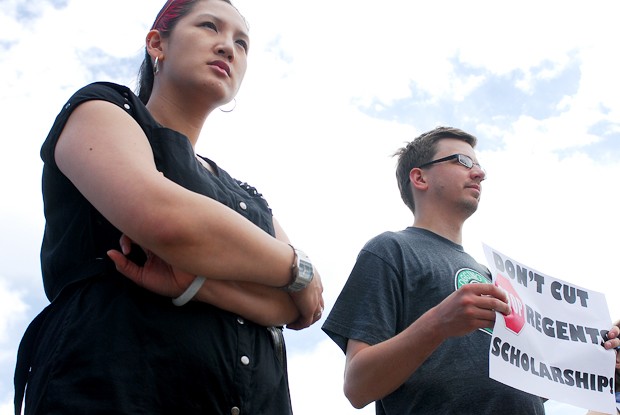UPDATE: The full Board of Regents voted Friday 10-2 to pass the proposed cuts to the scholarship program. See the Newsstand blog for more on the boardâÄôs discussion. —————————- A couple hours after the University of Minnesota Board of Regents Faculty, Staff and Student Affairs Committee unanimously recommended cuts to the Regents Scholarship , about 60 employees and supporters rallied outside the McNamara Alumni Center Thursday afternoon to protest the cuts. The scholarship currently provides free tuition to staff working at least 75 percent time . Annually, itâÄôs used by between 2,300 and 2,400 employees and costs the University $9 million. The aim of the cut is to shave $2.5 million from the program . Thursday, Carol Carrier, vice president for human resources , brought forth a proposal that would require staff working towards their first baccalaureate degree to cover 10 percent of their tuition, and all others to cover 25 percent. This is a change from the UniversityâÄôs previous proposal, which would have reduced its tuition contribution to 75 percent for everyone in the program. But, at the rally, organized by the local American Federation of State, County, and Municipal Employees union, protestors said it wasnâÄôt enough. âÄú[ItâÄôs like] being robbed for only half the amount,âÄù said Jason Iversen, a University library assistant and AFSCME technical workersâÄô union vice president. Iversen also questioned how having one fewer person in a course would save the University money, and said it seemed the University was trying to create another revenue source rather than cut costs. Tuition for an employee in the program is paid to the college offering the course, and comes from a central administration fringe benefits fund, according to University News Service , Carrier told the committee the program was meant to give the most help to those pursuing their first baccalaureate degree. ItâÄôs a difficult issue, Regent Clyde Allen told the committee, and âÄúwe all wish we didnâÄôt have difficult economic times.âÄù But theyâÄôd set out the cost-cutting principle that âÄúeverything must be on the table,âÄù he said, and had to be consistent in this case. Carrier said the University aims to cut spending on the Regents Scholarship by $2.5 million. Savings will come from both employee tuition contributions and people enrolling in fewer classes through the program, she said. Sara Hurley , a web coordinator for the University, has been pursuing her doctorate with the Regents Scholarship. But because of the cuts, Hurley said she is considering quitting her job to be a graduate assistant. The cuts, she said, indicate the institution isnâÄôt really valuing staff, and will keep talented people from being recruited. Carrier, however, said she doesnâÄôt think the cut will deter potential employees. âÄúItâÄôs still a really generous program,âÄù she said, and added that private companies are cutting or dropping tuition reimbursement programs as well. But Hurley, speaking at the rally, disputed characterizing the program as something extra, saying it had been advertised as part of their compensation. Jordan Bronston , a student representative to the committee, said heâÄôd been outside watching the protest after the meeting. âÄúI donâÄôt want to see anybody get cut,âÄù the economics senior said, âÄúbut itâÄôs just what happens in an economy like this.âÄù Bronston said heâÄôs received many e-mails about the cuts, and expressed to the regents that the budget burden should be spread equally among a lot of people, not just a certain group. âÄúI think that the scholarship cut was appropriate,âÄù he said, adding it seemed the administration saw it as a way to reduce tuition hikes. âÄúItâÄôs a way to spread the cuts âĦ I think theyâÄôre looking to figure out a way that they can make the best decisions for the majority of people,âÄù he said. Several speakers at the rally said a Regents Scholarship reduction places the budget burden disproportionately on those least able to afford it, and said highly paid administrators should take cuts instead. Regent Dallas Bohnsack responded to that notion by referencing the salary freeze, which includes top administrators. Bohnsack said the cut was a matter of how to most efficiently spend money, referencing AllenâÄôs statement to the committee that $3 million would translate to 50 jobs. In better economic times, he said heâÄôd like to see the University go back to covering 100 percent of employee tuition. Student representative Bronston said cuts at the top might compromise the UniversityâÄôs competitiveness. Still, he acknowledged, âÄúno matter what, youâÄôre going to upset someone âĦ and I feel for a lot of people who are getting hit.âÄù

Image by Marija Majerle
Employees protest proposed Regents Scholarship reduction
The proposal passed a committee Thursday and the full Board of Regents will vote on it Friday.
Published May 7, 2009
0

